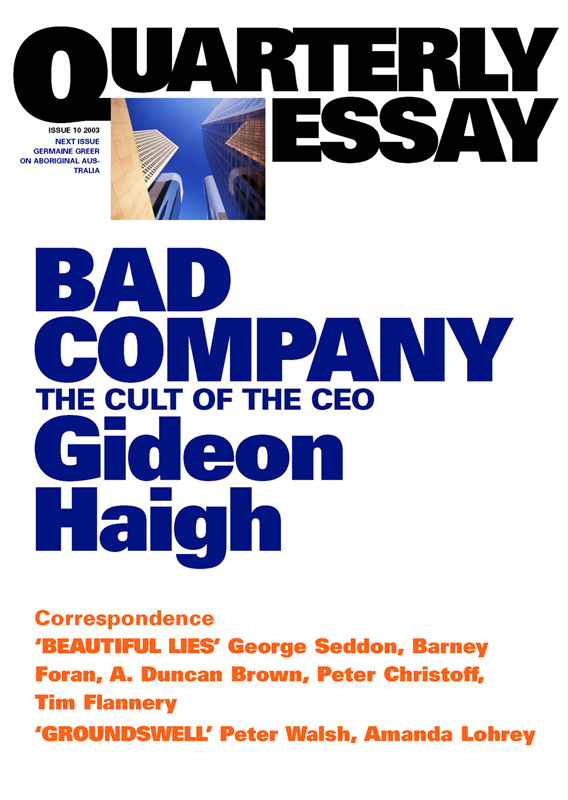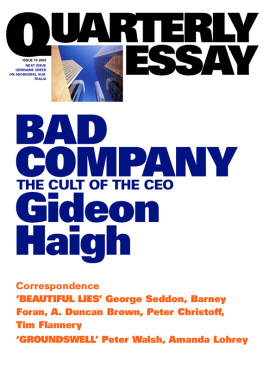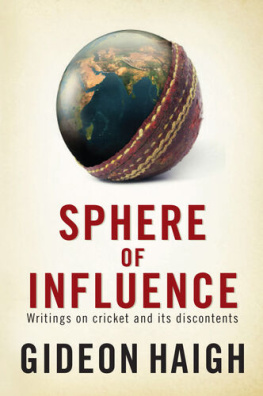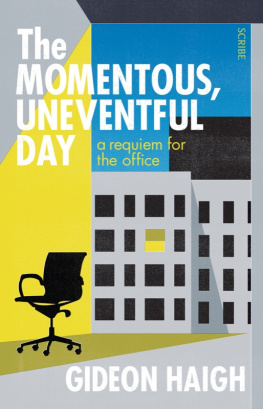Quarterly Essay

Quarterly Essay is published four times a year by Black Inc., an imprint of Schwartz Publishing Pty Ltd
Publisher: Morry Schwartz
ISBN 1 86395 355 8
To subscribe online please visit:
www.quarterlyessay.com
Correspondence and subscriptions should be addressed to the Editor at:
Black Inc.
Level 5, 289 Flinders Lane
Melbourne VIC 3000 Australia
Phone: 61 3 9654 2000
Fax: 61 3 9654 2290
Email: quarterlyessay@blackincbooks.com
http://www.quarterlyessay.com
Editor: Peter Craven
Management: Sophy Williams
Managing Editor: Chris Feik
Editorial Co-ordinator: Caitlin Yates
Publicity: Meredith Kelly
Design: Guy Mirabella
Printer: Griffin Press
CONTENTS
Peter Craven
BAD COMPANY
The Cult of the CEO
Gideon Haigh
George Seddon, Barney Foran, A. Duncan Brown, Peter Christoff,
Tim Flannery, Peter Walsh, Amanda Lohrey
Quarterly Essay aims to present significant contributions to political, intellectual and cultural debate. It is a magazine in extended pamphlet form and by publishing in each issue a single writer at a length of at least 20,000 words we hope to mediate between the limitations of the newspaper column, where there is the danger that evidence and argument can be swallowed up by the form, and the kind of full-length study of a subject where the only readership is a necessarily specialised one. Quarterly Essay aims for the attention of the committed general reader. Although it is a periodical which wants subscribers, each number of the journal is the length of a short book because we want our writers to have the opportunity to speak to the broadest possible audience without condescension or populist shortcuts. Quarterly Essay wants to get away from the tyranny that space limits impose in contemporary journalism and we give our essayists the space to express the evidence for their views and those who disagree with them the chance to reply at whatever length is necessary. Quarterly Essay will not be confined to politics but is centrally concerned with it. We are not interested in occupying any particular point on the political map and we hope to bring our readership the widest range of political and cultural opinion which is compatible with truth-telling, style and command of the essay form.
Gideon Haighs Bad Company:The Cult of the CEO is the tenth of the QuarterlyEssays and something of a departure for us because it does not, in any obvious sense, emerge from a broad consensus of left-liberal opinion. On the contrary, Haigh is not only a devout believer in capitalism, he is someone who is not interested in the contemporary witch-hunt about the mad, bad CEOs who have destroyed their companies, crippled their shareholders and generally acted like criminals.
Or rather he is interested in this only as the symptom, in extremis, of a deeper disease. He cites John Kenneth Galbraith to the effect that there will always be an element of embezzlement in business and that different economic climates and different economic cycles will highlight it in different ways, nor is its perception wholly distinct from fashions and counter-fashions.
But the grosser examples of corporate misbehaviour, which inflame the Right and Left, are not Gideon Haighs primary emphasis. What he is interested in is not the crooks per se but the wholly conventional captains of industry who we have elected to believe are the colossi of a market world of which they seem the emblems and the epitomes. What gets dubbed globalisation, Haigh remarks at one point, is simply the regnancy of the American way of managing economies of all kinds and what goes along with this is the apotheosis of the managers.
Not the managing directors, of course, thats yesterdays parlance enshrining yesterdays modesties, it suggests that the wondermen are merely the first among equals. No, the CEO in his contemporary incarnation is possessed of the traditional mana of kinship and he (generally its a he) is paid so royally that you have to wonder what blind faith is hedging him with such divinity.
Gideon Haigh takes the coldest possible view of all this. He simply does not believe that you can take an upper-level managerial axe-wielder (trained on exactly the same Harvard MBA doctrine as all the other axe-wielders) and turn him into a genius of business by fabricating a status for him as some kind of stakeholder (a term that irresistibly reminds Haigh of the world of Dracula).
Haigh believes that the system of paying the CEOs the earth represents the folly of believing that you can turn humdrum generals into Napoleons by the simple procedure of remunerating them as only a thaumaturge could sanely be rewarded. It is an attempt to create great entrepreneurs out of hireling managers by the flawed method of giving them equity and stock options.
It sounds like a good enough idea in theory that the newly hired CEO will act more in the interests of his adoptive company if he has a stake in its fortunes until you realise he can effortlessly divest himself of these interests to his own financial benefit when it happens to suit him.
There is also an inherent absurdity for Haigh in the idea of instantaneously rewarding the brilliant CEO when true wisdom in business is not likely to be measurable for years, sometimes many years, after the event.
We have become used to the spectacle of the new-style CEO who sacks some bewildering fraction of the staff (often people doing crucial jobs in companies with little fat) for the sake of the figures, as if this was an end in itself. We have also seen the kind of CEO was Donald Rumsfeld, the Secretary for the War on Everything, in this category? who window-dresses simply for the purpose of selling the shop.
Much of what passes as business doctrine these days is to Haigh just a fire lit by heretics. Hence his disdain for figures like Chainsaw Al Dunlap, who did not change the world of business to anyones betterment apart from their own, they simply interpreted it as a graph for their egos and solaced themselves with dogs who could not talk back.
One of the distinctive things about Gideon Haighs Bad Company is that it is written against the post-Iacocca CEOs from the conservative position of someone who has a deep belief in the history of sane business practice and sees it mocked by the mutations it has suffered, which are still slavishly valorised by the very people who scream about the crimes of the crooked CEOs without realising that much the greater problem is structural.
Thats one reason why this Quarterly Essay, written in the wake of the HIH outrage and a general Australian wave of horror at CEOs gone crazy, is first of all a kind of history of business and is, secondly, so preoccupied with the American paradigm and the way it has impacted on international practice.
Haigh believes that you cannot offer a critique of contemporary business unless you are conscious of how much it comes out of the past and how radically it departs from it. He does not think you can understand the excesses of the Australian CEOs even though his focus on them becomes closer as Bad Company moves towards its conclusions unless you understand how parasitic they have been on an American model which is itself flawed but which has at times been efficacious in its own terms. (Haigh thinks that the celebrity-style American CEOs tend to be bad news but that at least they have increased profitability which is more than can be said for their marsupial brethren.)
Next page











